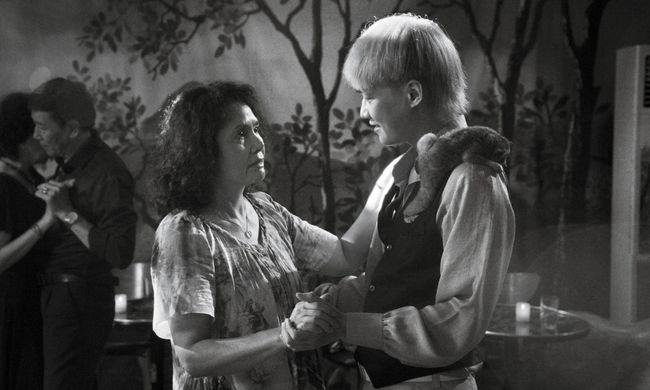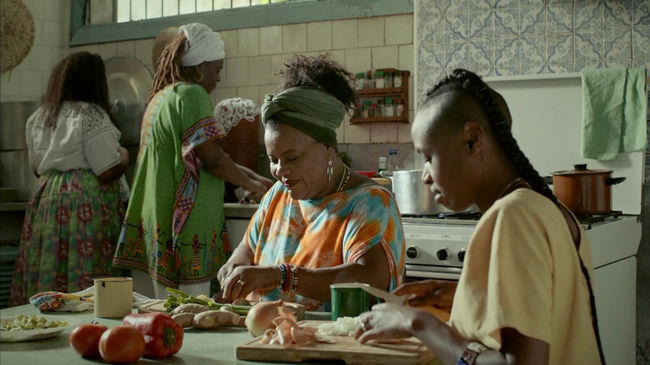Filmmaker profile: Mamadou Dia
23 July 2019
Mamadou Dia about the impact of HBF on his new film Baamum Nafi
In early 2018, Senegalese filmmaker Mamadou Dia received a Hubert Bals Fund (HBF) development grant. Now, his first feature film is almost finished. We talked to him about the impact of HBF, the Senegalese film industry, and the power of cinema.
Dia’s new film, titled Baamum Nafi (Nafi’s Father), follows Tierno, who struggles to balance his role as a Sufi religious leader in rural Senegal and a father, as he tries to prevent his daughter from marrying her cousin. Dia: “I had been working on the script since 2016. After graduating with my master’s degree in film at New York University, I lived between the United States and Senegal, spending much of my time working as a director of photography or as a camera assistant, just to be able to pay my bills. Getting the HBF grant allowed me to take some time and say: I’m going to finish this script. After that, I was lucky to find private investors and friends who believed in the project and stepped in with additional funds. At such an early stage, the money from Rotterdam really made the difference.”
At such an early stage, the money really made the difference
— Filmmaker Mamadou Dia
The shoot took place in Dia’s hometown in Matam, northern Senegal. “It’s a small town and I know everyone there, every house, the mosque, et cetera, which was helpful as it kept the budget low.”
Senegalese cinema on the rise
Co-productions are common in Senegal, says Dia. “For example, Alain Gomis and Mati Diop both work with Franco-Senegalese teams. Internationally, most Senegalese films are still considered low-budget, but I’d say they cost a fair amount of money, which comes from various sources. I know that some Senegalese films received HBF money in the past, or grants from other foreign funds, but at the same time most Senegalese films are supported by our national Fond de promotion aux initiatives culturelles. The producers are able to make a financial plan that works.”
People are getting enthusiastic again.
— Filmmaker Mamadou Dia on the boom in Senegalese cinema
Senegalese cinema is booming, both in numbers and in quality, says Dia. Mati Diop’s Atlantics won the Grand Prix at Cannes 2019. Alain Gomis’s Félicité won the Jury Grand Prix at Berlinale 2017. And at the most recent FESPACO, Senegalese films won two of the top three prizes in the short-film section.
Dia: “The Senegalese film industry used to be huge in the 80s, when people like Djibril Diop Mambéty, Ousmane Sembène and Mahama Johnson Traoré were making movies. Then we saw a slump in the late 90s and 2000s. But now, in the last five or ten years, Senegalese cinema is booming again. The government supports the industry, new cinema theatres are opening their doors in Dakar, and people are getting enthusiastic again. The good thing is that the technical knowledge from the 80s is still here. You could make a feature film with an entirely Senegalese crew. The experience is here.”
Telling the stories that need telling
Baamum Nafi is the result of weaving together personal stories and contemporary societal issues. In the film, extremist religious groups try to infiltrate a Sufi community by means of marriage. Dia: “In northern Senegal it’s still common to have what is called an early marriage. It’s how my sisters and cousins get married. Sometimes it works and sometimes it doesn’t. In the film, I wanted to imagine what would happen if religious extremists were to abuse this system to recruit people. Because, if you pay for someone’s marriage, they kind of unofficially owe you something. In the film, the drama that ensues between family members is expressive of a bigger contemporary issue in West Africa.”
I wanted to show the strength of women in my community.
— Filmmaker Mamadou Dia
Although religious extremism hasn’t set foot in Senegal specifically, it has in other West African countries like Mali and Nigeria. Dia: “Senegal has strong institutions and is a very tolerant country when it comes to religion. We even have mixed couples and one mixed cemetery, where Muslims and Catholics are buried beside each other. But I wanted to stir the debate. Religious extremism should be a concern in any country in the world. The film is asking questions about what could happen if a community ignores the early warning signs and allows extremist influences to take hold.”
Before jumping into artistic filmmaking, Dia worked as a journalist for eight years. “News agencies are always reporting about starvation, diseases, droughts and things like that. Film has given me the liberty to show a different story. For me, I wanted to show the strength of the women in my community, something people don’t speak about very often. As a journalist, my video work would get edited – often just for clarification, but sometimes for other reasons as well. Organisations like the Hubert Bals Fund help me to get a different story out there, without anyone editing my work. Being able to work on my own project for years, in my hometown, and with very talented people has been hugely rewarding.”
IFFR screened Mamadou Dia’s short film Samedi Cinema in 2017. Dia’s feature film debut Baamum Nafi will see its world premiere at Locarno International Film Festival 2019.
Written by Daan Schneider











